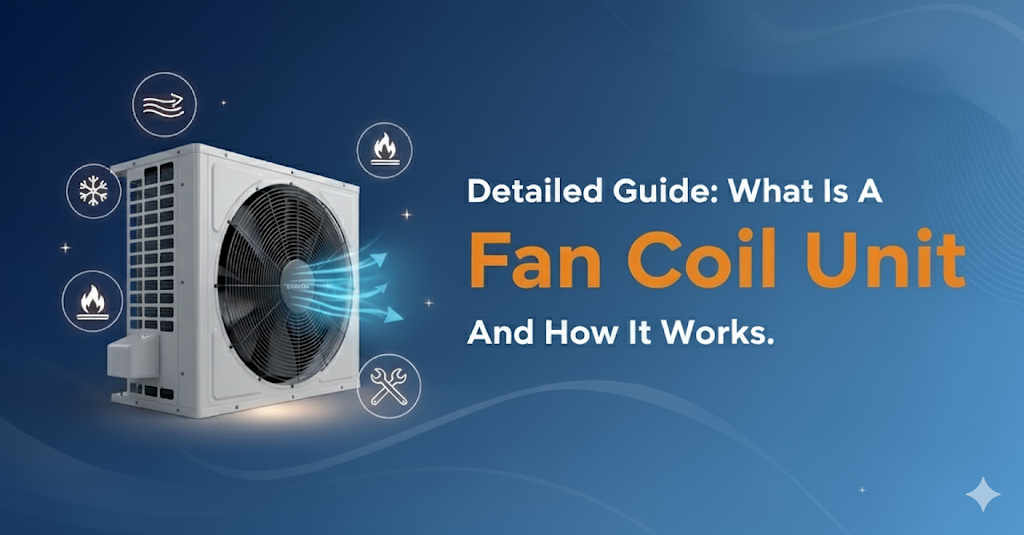Introduction:
What Is A Fan Coil Unit and Why Does It Matter
If you’re exploring HVAC solutions for your home or business, you may have come across the term fan coil unit (FCU). But what is a fan coil unit, and why does it matter? In simple terms, it’s a vital component in heating, cooling, and maintaining indoor comfort. Fan coil units are versatile, compact, and effective devices used in residential, commercial, and industrial buildings. They play a crucial role in delivering comfort by regulating air temperature and enhancing air quality.
At GM HEATING AND COOLING INC, we understand that choosing the right HVAC equipment can feel overwhelming. That’s why this guide breaks down everything you need to know about what is a fan coil unit, its components, how it works, and why it might be the right choice for your space.
What Is A Fan Coil Unit? A Complete Definition
A fan coil unit is a standalone HVAC device that consists of a fan and a coil designed to either heat or cool the air in a room. Unlike central HVAC systems, which rely on extensive ductwork, FCUs can operate independently or as part of a larger system connected to a boiler or chiller.
The coil acts as a heat exchanger:
- In cooling mode, chilled water or refrigerant flows through the coil, removing heat from the air.
- In heating mode, hot water or an electric heating element warms the air.
The fan then circulates this conditioned air directly into the room, making FCUs ideal for zonal temperature control. If you’ve ever wondered what is a fan coil unit in everyday use—it’s essentially a compact, energy-conscious device that gives you flexibility and comfort.
Main Components of a Fan Coil Unit
To fully understand what is a fan coil unit, it helps to break down its core parts:
- Fan
- The fan circulates air over the coil.
- Modern FCUs often use centrifugal fans, which are efficient and quiet.
- Coil
- This is the heart of the FCU, where heat transfer happens.
- It may be a cooling coil (chilled water/refrigerant) or a heating coil (hot water/electric element).
- Filters
- Filters trap dust, allergens, and debris, keeping the air clean.
- Regular filter maintenance is key to efficiency and indoor air quality.
- Thermostats & Controls
- Controls allow you to set desired temperatures.
- They range from basic manual controls to smart, programmable thermostats that optimize comfort and energy use.
By combining these parts, a fan coil unit ensures reliable, consistent heating and cooling tailored to the needs of individual spaces.
How a Fan Coil Unit Works in Heating and Cooling
Now that we’ve covered what is a fan coil unit, let’s explore how it operates.
- Cooling Mode
- Chilled water or refrigerant flows through the coil.
- The fan blows warm room air over the coil, where heat is absorbed.
- Cool air is circulated back into the room.
- Heating Mode
- Hot water or electricity heats the coil.
- The fan pushes cool air across the coil, warming it before re-circulation.
- Airflow Design
- The airflow is engineered to maximize efficiency and provide even comfort.
- Proper airflow ensures consistent temperatures and reduced energy costs.
In short, a fan coil unit works by blending mechanical airflow with heat exchange, delivering precise climate control.
Types of Fan Coil Units: Choosing the Right One
When asking what is a fan coil unit for your property, it’s important to understand the types available:
- Ducted Fan Coil Units
- Installed above ceilings or hidden in walls.
- Deliver air through ductwork.
- Great for larger spaces where aesthetics matter.
- Wall-Mounted Fan Coil Units
- Mounted visibly on walls.
- Easy to install and service.
- Ideal for small spaces or retrofit projects.
- Cassette Fan Coil Units
- Installed in ceilings, only the grille is visible.
- Common in offices, hotels, and modern homes.
- Floor-Mounted Fan Coil Units
- Placed directly on the floor.
- Useful where walls or ceilings cannot support units.
- Easier to access for maintenance but may use floor space.
Each type has unique advantages depending on building design, space, and budget.
Advantages and Disadvantages of a Fan Coil Unit
Like any HVAC option, FCUs come with pros and cons.
Advantages:
- Zonal Control: Heat or cool only occupied rooms, saving energy.
- Efficiency: Lower energy bills compared to central systems.
- Easy Installation: Ideal for retrofit projects.
- Low Maintenance: Filters and coils are simple to clean.
Disadvantages:
- Noise: Fans may produce sound if not maintained.
- Performance Limits: Less powerful than large central systems.
- Regular Maintenance Needed: Efficiency drops if filters or coils are neglected.
By weighing these factors, you can decide if a fan coil unit suits your property’s needs.
What Is a Fan Coil Unit Installation Like?
If you’re considering what is a fan coil unit installation, here’s what to expect:
- Assessment of Load Requirements
- Professionals calculate the heating/cooling needs of your space.
- Unit Placement
- Placement depends on room layout and desired airflow.
- Connections
- FCUs are connected to chilled water, hot water, or refrigerant lines.
- Electrical wiring and thermostat integration are completed.
- Testing & Balancing
- The system is tested for proper airflow, comfort, and efficiency.
At GM HEATING AND COOLING INC, our technicians ensure safe, code-compliant installation so your FCU operates efficiently from day one.
What Is a Fan Coil Unit’s Impact on Indoor Air Quality?
Another way to answer what is a fan coil unit is by looking at its role in air quality.
- Filters trap airborne particles, reducing dust and allergens.
- Steady airflow promotes even circulation, reducing stagnant air.
- Proper maintenance ensures healthier, cleaner indoor environments.
For homes and offices, this means better comfort and fewer health concerns linked to poor air quality.
Maintenance Tips to Keep a Fan Coil Unit Running Efficiently
To make the most of what is a fan coil unit, maintenance is essential:
- Clean or Replace Filters Regularly
- Prevents airflow restriction and maintains air quality.
- Inspect Coils
- Dust buildup reduces heat exchange efficiency.
- Check Electrical Components
- Thermostats, wiring, and fans should be tested for performance.
- Schedule Professional Servicing
- Partner with experts like GM HEATING AND COOLING INC for inspections.
- Regular maintenance extends the lifespan of your FCU.
Conclusion:
What Is a Fan Coil Unit and Why It’s a Smart Choice
So, what is a fan coil unit? It’s a versatile HVAC device that combines a fan and coil to deliver heating and cooling directly to your space. Whether wall-mounted, ducted, or floor-based, FCUs offer flexibility, zonal control, and energy efficiency.
At GM HEATING AND COOLING INC, we help homeowners and businesses choose, install, and maintain the right HVAC solutions, including fan coil units. With the right setup and care, an FCU can provide years of reliable comfort while saving energy.
If you’re ready to explore fan coil units for your property, contact GM HEATING AND COOLING INC today for expert advice and installation services.


